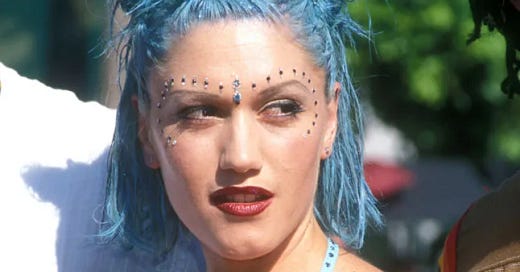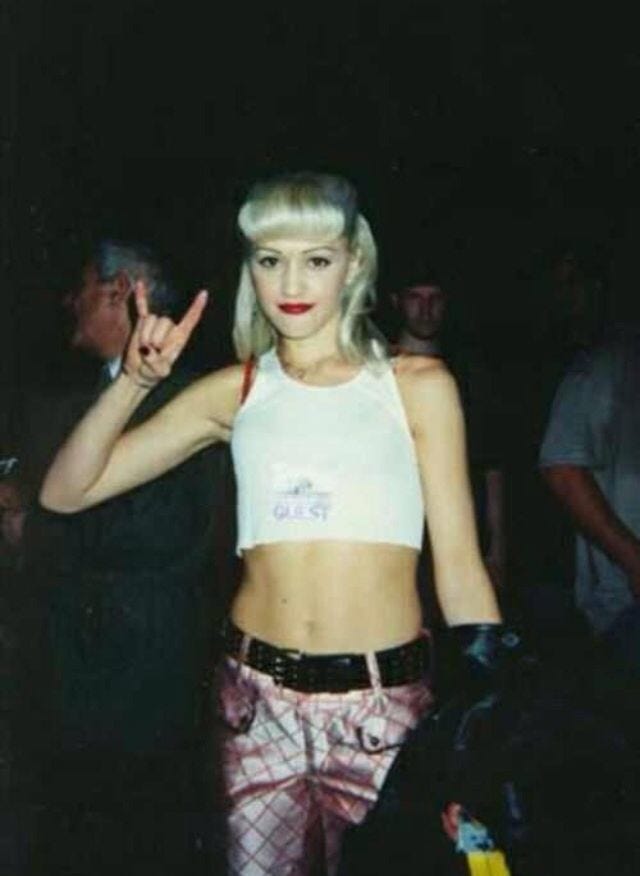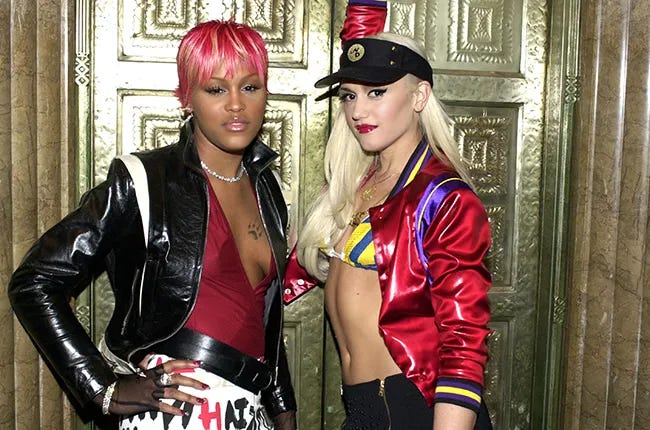Goodbye ‘Gwen Stefani’
She’s just a girl (who’s not actually for the girls.)
Growing up, Gwen Stefani was my hero. As an adult, not so much.
The latest rumour circulating the internet is that the infamous peroxide pop punk icon, and former No Doubt singer, has crossed over to the Republican side. Criticisms include her new public image as a ‘religious’ sort and her promotion of a problematic app called Hallow that encourages people to ‘pay to pray’ and has advertising affiliations with….wait for it…Russell Brand.
Her supposed descent into conservatism has been a hot topic since she began her relationship with country singer Blake Shelton, an open Republican and a man who couldn’t seem any further from her particular brand of ‘cool’.
But I’ve had a niggling sense for a while now that this so-called radicalisation of Stefani is not so sudden, nor surprising.
As much as I loved No Doubt as a teenager, this has always been her jam. We just didn’t want to believe it.
The shit is BANANAS
I stumbled upon a Buzzfeed article a few months ago titled The New Gwen Stefani is a Lot Like the Old One that questioned whether Gwen Stefani really was the feminist icon that young women in the ‘90s wanted her to be.
The conclusion was that, no. She wasn’t.
In hindsight, Stefani’s rise functioned as a pivot in the history of feminist rock: the first of many moments in a backlash that would transform a movement fuelled by anthems like Hole’s “Doll Parts” and Bikini Kill’s “I Like Fucking” into a sparkly mimeograph of itself, a retort to the stereotypical notion of humorless feminists who hated lipstick.
However false that dichotomy the guiding logic of the mid-’90s, when the label of “feminist” was subsumed by a different way of being a girl in the world. This new mode was just as public, yet far more palatable to mainstream audiences, in part because it traded transgression, rage, and the rejection of feminine norms for the consumption and cultivation of “innocent” sex appeal.
“I love makeup,” Stefani told Spin in 1996. “I love getting my hair done. I love getting pedicures. I’m the furthest thing from a rock chick.”
Having recently delved into the music of my teenage years, one thing that seems glaringly obvious to me as a 35 year old - but was (unfortunately) barely noticeable to me from the ages of 13-16 - is that the alternative music scene was scarce with women.
This is probably why in a sea of emo, pop punk, ska, nu-metal, and hardcore, girls like me latched on to Gwen Stefani. Granted, Tragic Kingdom pre-dated this mid-00s punk revival by a number of years, but even as a kid, Stefani stood out to me as an edgier, cooler pop star with rock sensibilities who (in true ‘Pick Me’ fashion) “wasn’t like other girls”.
I remember seeing the ‘Just A Girl’ video for the first time on an MTV show about ‘women who rock’ hosted by the Spice Girls and thinking Stefani was unbelievably cool.
The platinum hair, the red lips, the pin up brows and liner, the crop tops and baggy jeans covered in chains and zips. She’s in a band of BOYS. She sings about how much it sucks to be a girl! She’s fun and cute and not offensive - my mam will actually let me buy this album!
Hot off the back of the Girl Power explosion in the ‘90s, Stefani was a natural progression for both my music taste and as an outlet for my inner riot grrl before I ever knew the feminine rage was there.
But what I didn’t realise, perhaps due to age, access, and ignorance, is that Stefani was playing to a role that didn’t quite fit her nor was she 100% comfortable with.
The point of being ‘punk rock’ , I guess, is about not conforming, breaking down barriers, and in the context of feminism, letting girls have a seat at the table.
I would of course later discover the likes of Bikini Kill, L7, Hole, and Bratmobile for myself, who all rose in Stefani’s era. While they arguably had much more bite, they weren’t nearly as popular.
So there it is, and always was. Stefani was punk-lite; diluted, a little too polished and ‘not into politics’. The Buzzfeed article refers to the fact that Stefani has always told us who she is - especially when critiqued on numerous occasions for cultural appropriation.
“I said, 'My God, I'm Japanese and I didn't know it.'" She commented, in an interview with Allure, which queried her obsession with Japanese culture and her decision to employ a harem of ‘Harajuku girls’ to follow her around in the mid 2000s.
Until that point, I’d been desperate to believe my childhood hero was perhaps just a bit clueless. Or very poor at explaining herself. Or that over time she had maybe learned from her mistakes because ‘it was a different era’ and that perhaps she didn’t realise how bad it was at the time.
But this interview was conducted in 2023 when she was 54 years old. It dawned on me that Stefani not only hadn’t changed but that she was never fighting that corner in the first place. That’s when *I* realised Gwen Stefani kinda sucked.
She’s always been ‘a traditional girl’ who just wanted to be a wife and mother - there’s nothing wrong with that of course. She is conservative in that she doesn’t want to speak out on sex and abortion and women’s rights - that’s more of an issue. But she’ll happily advocate for ponytails and wearing your favourite lipstick even though you’re hanging out at the skatepark.
As a naieve kid that was probably the level of feminism I could get on board with but at my big age and in this day and age, it’s not enough.
‘For the girls’
Let’s be fair though. Stefani isn’t the only pop icon who isn’t ‘for the girls’ as much as we think she is.
The ongoing discourse about Sabrina Carpenter is a perfect example. To some, she is a unapologetically feminine and sexually liberated pop girlie who has fun with ‘wink wink, nudge nudge’ lyrics that reveal her as a real ‘girls girl’. To others, she’s someone who merely ‘performs’ sexuality that panders to an outdated fantasy and fails to capture the full depth of a true female experience.
Taylor Swift is another prime example. Swift was praised for advocating for women and creating music that’s catered to the ‘female gaze’ I.e. not giving a shit what men think. However, as many critiques point out, much of Swift’s feminism centres around white feminism and issues that only affect her.
I don’t believe it’s always fair to hold pop stars to incredibly high standards when it comes to speaking out and platforming on socio- political issues - specifically when such expectations are much higher for female stars than their male counterparts. Most aren’t artists in the same way as those in say, punk circles, are - they’re more like products. And some are just not about that anyway. We deserve SOME escapism. Though with such a large captive audience, it’s impossible to ignore that it’s a huge missed opportunity.
With all that said, these are the figures that young people do look up to. And perhaps if Stefani had been as ‘punk rock’ as we all wanted her to be, as the front woman to a breakout ska outfit in the ‘90s, then perhaps her influence on young women could have been 100x more positive and much less shallow. Then again, if her politics were always this conservative, No Doubt would have been even more out of place in their respective scene*.
*Lest we forget that punk aside, ska is specifically rooted in black culture, with subsequent waves overlapping class and championing equality.
Ain’t No Hollback Girl
What’s also notable is how much more public Stefani‘s apparent politics are following her marriage to Shelton. We know that typically people get more conservative as they get older. We also have access, and feel more entitled, to know more about our favourite celebrities’ personal politics. Perhaps this is what has made Gwen feel more emboldened about putting her religious beliefs out there or maybe it’s because society demands it?
But Shelton’s supposed influence does pose the question on whether she really has changed for a man.
The ‘Pick Me’ girl debate is alive and well on TikTok; these are the women who covertly centre men over their fellow sisters (another topic for another day..) and harm other women in the process. And what’s more ‘Pick Me’ than loudly aligning yourself with a religion that historically has tried to control women’s reproductive rights EVEN MORE LOUDLY after marrying a dude who feels the same?
Stefani clearly always was a good Catholic girl but (though it pains me to say it) she’s the OG ‘Pick Me’.
While there will always be a little part of me that will still love the version of her I created in my head during those formative years, this is a lesson learned that not only should you never meet your heroes - you probably shouldn’t know too much about them either.
Really though, you probably shouldn’t hang your hopes on pop stars who have no intention of being a hero.
Sorry Gwen, but I’ve had it up to here.









I’m seeing a number of posts about Gwen and her current political leanings. I honestly didn’t recognize Nashville Gwen in her “All Your Fault” video. Her distinctive voice (that I love) assured me it was indeed her.
Perhaps she’s appropriating country conservatism the same way she did Japanese heritage? Another artistic phase is a possibility.
I’m the chick who shows up to punk shows in a floral dress and red lipstick, so I have no room for judging what’s feminist when it comes to appearance— or should I say that as a feminist, I don’t believe appearance determines your stance on gender equity.
What one says and does defines it.
This “Pick Me Girl” term is new but the concept is ancient. I see it everywhere and have admittedly been that girl in the past. It undermines women’s progress in equal rights, opportunity, representation, and body autonomy in pursuit of acceptance and security. But as we know, women who give up their rights for security deserve and will get neither.
Gwen’s 55 and maybe just now comfortable enough with her conservative beliefs to go public, or maybe she’s just a Pick Me Girl. Only she knows.
I’m 56 and am becoming more liberal and outspoken with age as I see men in power trying to destroy our collective American Dream. And there are hundreds of thousands of old ladies like me. Hopefully that balances the scales. ⚖️
Thx for the thoughtful read.
🚺🎶🤘🏻💜
Great piece! I grew up on No Doubt as well, and felt like they were punk pop and deeply shallow.
Gwen’s voice was good but uncomfortably similar to Dale Bozzio’s of Missing Persons. Listen to Bozzio sing on their new wave hit, “Walking in L.A.” for a good example.
Young singers mimic their idols, but this always felt like a rip off.
As far as her budding conservatism, you can take the girl out of Orange County but…